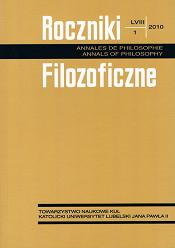Pojęcie istnienia w czasie a pojęcie współistnienia z czasem w Monologionie Anzelma z Canterbury
The Concept of Existing at a Time and the Concept of Coexisting with a Time in Monologion by Anselm of Canterbury
Author(s): Marcin TkaczykSubject(s): Philosophy
Published by: Towarzystwo Naukowe KUL & Katolicki Uniwersytet Lubelski Jana Pawła II
Keywords: antinomy; Anselm; God; time; antynomia; Anzelm; Bóg; czas
Summary/Abstract: Anselm of Canterbury’s method to avoid antinomies in theology is presented and analyzed. In Monologion Anselm argues in favour of God’s existing at every time and every place on one side, and in favour of God’s existing at no time and no place on the other side. But this constitutes an antinomy, because e.g. for any time t God’s existing at the time t and God’s not existing at the time t are equally provable. Anselm claims ambivalence of terms of natural languages to be responsible for the antinomy. Anselm’s solution is to introduce to theological discourse two artifical terms: „existing at a time” and „coexisting with a time”. Those terms are provided with precise meaning, which constitutes deductional relationship between them. For any x and t , if x is existing at a time t , then x is coexisting with the time t. The converse is, however, not valid. This Allows Anselm to avoid the antinomy. The anticipation of Duns Scotus’ theory of univocity and some contemporary ideas of non-classical logics is also discussed.
Journal: Roczniki Filozoficzne
- Issue Year: 58/2010
- Issue No: 1
- Page Range: 247-262
- Page Count: 16
- Language: Polish

